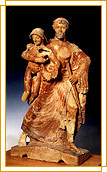The Olympic Games in Antiquity
"But you may say, there are some things disagreeable and troublesome in life.
And are there none at Olympia?
Are you not scorched?
Are you not pressed by a crowd?
Are you not without comfortable means of bathing?
Are you not wet when it rains?
Have you not abundance of noise, clamour, and other disagreeable things?
But I suppose that setting all these things off against the magnificence of the spectacle, you bear and endure".
Epictetus, 1st century AD.
The Olympic Games were the oldest and most important of all the
Greek competitions and the most important religious festival in
honour of Olympian Zeus, the father of the gods.  The reputation
of the sanctuary of Olympia spread all over the Greek world, while
soon the Olympic Games became the symbol of Pan-Hellenic unity. The reputation
of the sanctuary of Olympia spread all over the Greek world, while
soon the Olympic Games became the symbol of Pan-Hellenic unity.
The site and the importance of Olympia grew in time. From a simple worship area it developed into a sanctuary filled with elaborate temples -the largest among them being the Temple of Zeus- secular buildings and statues. New athletic events were added and new facilities were built in order to accommodate the athletes participating in the Games.
The Olympic Festival was held once every four years during the hottest days of the summer. During the five days of the festival, sacrifices were made to the altars of the gods, the most magnificent of them all being the sacrifice of one hundred oxen at Zeus' altar. Athletic competitions were held in the Stadium and the Hippodrome, in front of thousands of spectators from all the cities of the known Greek world. The victors were crowned with a wreath of wild olive, the kotinos, and enjoyed special honours in their hometown.
During the Olympic Games various athletic events were held, such as the stade race, wrestling, boxing, pankration, equestrian events and pentathlon (jumping, running, javelin, discus, wrestling). Those that participated followed common rules and conventions, which were established for the better organization of the games.
All the cities were obliged to suspend hostilities during the Games and all Greeks were allowed to participate. In addition, there were specific rules that regulated the training and the organization of the Games.
|
